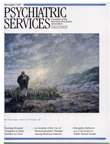Wasted: A Memoir of Anorexia and Bulimia
After years of lying and denial, 24-year-old Marya Hornbacher has written a remarkably candid autobiography that is compelling both for its content and for the quality of the writing. This is really a story of what it is like to live through horrendous mental illness, although the form the symptoms take are anorexia and bulimia. I was reminded of other powerful memoirs of mental illness, such as Darkness Visible by William Styron (1) and Kay Redfield Jamison's book (2) on her bipolar disorder, An Unquiet Mind.
Ms. Hornbacher describes her life as the only child of two unhappy people who are as puzzled and confused by her as she is herself. She began bingeing and purging at age nine. The agony of her life continues into an adolescence characterized by excessive drug and alcohol abuse and sexual acting out, as well as every kind of eating-disordered behavior. She describes herself at 16 as "a girl trying hard to die."
The book includes graphic and horrifying descriptions of three periods in Ms. Hornbacher's life when her eating disorder gets so out of control that it looks as though she may die. After the last episode, weighing 52 pounds, she was given a week to live. Before she finally got help, she had been attending college in Washington, D.C., and working as a reporter. Her account of how paralyzed those around her were as she deteriorated in front of their eyes is accurate and well done. She also includes an interesting analysis of the difference between more proactive forms of suicide and the "suicide/torture-self-murder of anorexia."
Contemporary thought about eating disorders increasingly acknowledges the underlying function of anxiety in their etiology. I was frequently struck by its role in Ms. Hornbacher's tortured life, yet anxiety is one of the few diagnoses she was never given. Nor does she seem aware how often what she is portraying is what we would probably now label as generalized anxiety disorder. She was school phobic as a small child; she checked frequently for monsters; and she states, "When I woke, there was always panic."
Wasted has much that is admirable. It is an extremely powerful depiction of the reality of living with a mental illness so potent that the very being is devastated. Ms. Hornbacher's attempts to explore the complexities of her illness do not spare her parents, but neither are they demonized. It seems to me she makes an unusually even-handed effort to understand her parents' part in her difficulties, and she eventually ends up acknowledging there is love between them. The author has been an avid reader since childhood and is a writer by profession, so the book is well written, with an extensive and interestingly diverse bibliography.
The book does not end with any epiphany, but with a much more realistic kind of fizzling out after her last dreadful collapse. By the time Ms. Hornbacher is writing the book, she is eating, weighs about double what she once did, and is married in what is clearly a loving relationship. Yet eating is still not something that can be taken for granted, and she worries about the dreadful toll her illness has taken on her.
Along the road, she has tried to write about what made a difference, such as being found and loved by an 11-year-old boy, who was even needier than she was, and eventually, reluctantly, caring for him in return. "I began to piece my life together, stitch together memories into a patchwork quilt that made a chaotic sort of sense," she says. The book is a remarkable narrative that would be of interest to anyone working in the field of mental illness, especially with eating disorders.
Ms. Miller is director of the Mount Holyoke College Counseling Service in South Hadley, Massachusetts.
1. Styron W: Darkness Visible: A Memoir of Madness. New York, Vintage, 1992Google Scholar
2. Jamison KR: An Unquiet Mind. New York, Vintage, 1995Google Scholar



